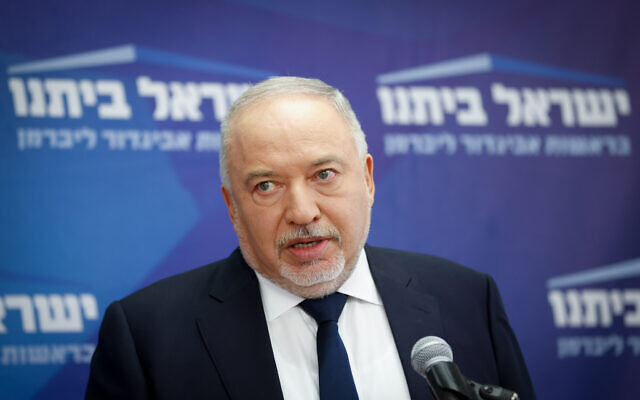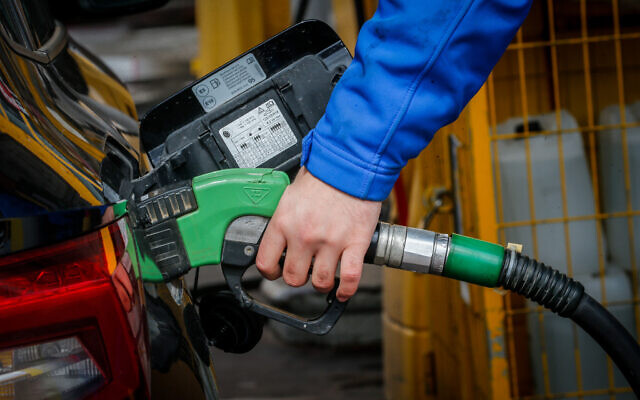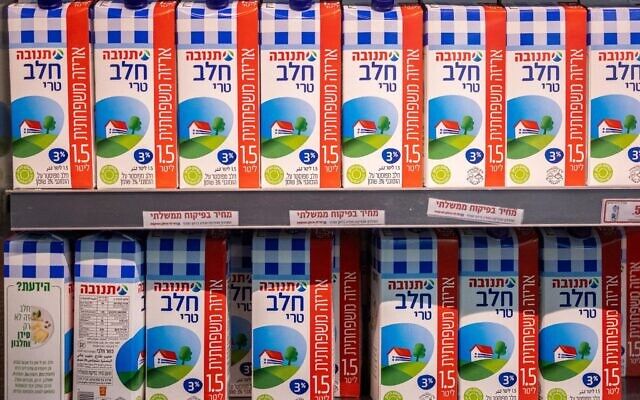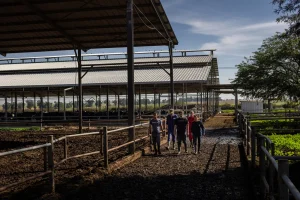
The first day of August brought a range of cost of living changes in Israel that pushed up electricity prices and the cost of milk, but made gasoline cheaper along with public transportation.
Price-controlled dairy items rose by 4.9 percent on Monday as agreed on last week by the Finance Ministry and milk producers. As a result of the change, a liter of milk will rise to NIS 6.23 ($1.84), and 28%-fat yellow cheese, known as Emek, will be NIS 44.79 per kilogram.
Power prices rose by 8.6%, slightly less than the initial 9.6% as announced by the Electricity Authority early last month.
In contrast, gasoline prices in Israel dropped by around NIS 1.50 ($0.44) per liter at midnight after having risen steadily in recent months.
Israelis will pay an estimated NIS 6.54 (approximately $1.92) per liter of gasoline, instead of July’s NIS 8.08 (approximately $2.37) — a record high not seen in Israel since 2012.
“We are all aware of the rise in prices due to the global economic crisis,” tweeted Finance Minister Avigdor Liberman.
“To my regret, the price of electricity went up overnight by NIS 0.0491 per kilowatt-hour,” he wrote. “It is important to understand that the price increase is due first and foremost to the global price of coal, which rose since the start of the year by 180%.”

Liberman said that electricity prices in Israel are low compared to other countries and that efforts were made to keep the price rise as low as possible.
Whereas an average family will pay NIS 35 more a month on electricity due to the change, the same family can expect to pay NIS 150 less at the gasoline pump, he calculated.
A major reform in public transportation also started on Monday, with prices halved for senior citizens between the ages of 60 to 75, children aged 5-18, and those with disabilities. Those over the age of 75 and under five can travel for free.
In other changes, journeys of up to 15 kilometers will cost NIS 5.50 and allow unlimited transfers to other lines for a period of 90 minutes after the journey starts.
Longer journeys of up to 40 kilometers will cost NIS 12, and those of up to 120 kilometers will be NIS 16.
Travel for over 120 kilometers will be NIS 27, though routes to Eilat, Israel’s most southern point, will have a separate pricing system.
Monthly bus passes that allow travel with all bus companies across the country will be NIS 225. A special bus monthly pass for journeys up to 40 kilometers will be available in periphery communities for NIS 99. However, the pass is not valid on Israel Railways or light rail networks.
Monthly passes can be purchased online using smartphones with the Rav Kav Online Line and Rav Kav Hop-on applications, or at hundreds of stores in 104 communities across the country.
In other August changes, further aspects of the 2019 Law for the Reduction in the Use of Cash came into effect.
The law limits the use of cash in any transaction with a business worth more than NIS 6,000, down from the previous amount of NIS 11,000. Transactions between private individuals is now limited to NIS 15,000, down from NIS 50,000. An exception is car purchases, in which up to NIS 50,000 can change hands between private individuals.

Alongside the various adjustments, there is also a standoff between leading supermarket chains and Diplomat, the top importer and distributor, which is seeking to raise the price on some products, including Starkist tuna, Oreos, Pringles, and Pantene hygiene products. Some of the supermarkets are refusing the hike, Channel 12 reported.
The gasoline price drop was the result of the government lowering the excise tax on gasoline for the second time this year, and the lower price of crude oil, which has been dropping globally since early June.
Oil prices spiked at $122.11 per barrel on June 8 — the highest price since March 8 — and have since dropped to approximately $98 as of Sunday.
This change is partly due to the concerns of a global recession, which in turn have predicted a lower demand for oil in the near future. Other reasons could be the release of United States oil reserves and a rise in oil production in countries including the US and Libya.
But even with lower oil prices, over half of the Israeli price for a liter of gasoline is the result of taxes.

Liberman reduced the tariff by half a shekel per liter in April, the same as the latest cut is expected to be the same, meaning a total NIS 1 in tax relief per liter.
This latest tax discount, however, is set to last only a month and prices are expected to go up again by half a shekel per liter by the end of August. The initial half-shekel tax reduction that began in April is set to expire at the end of January 2023.





















